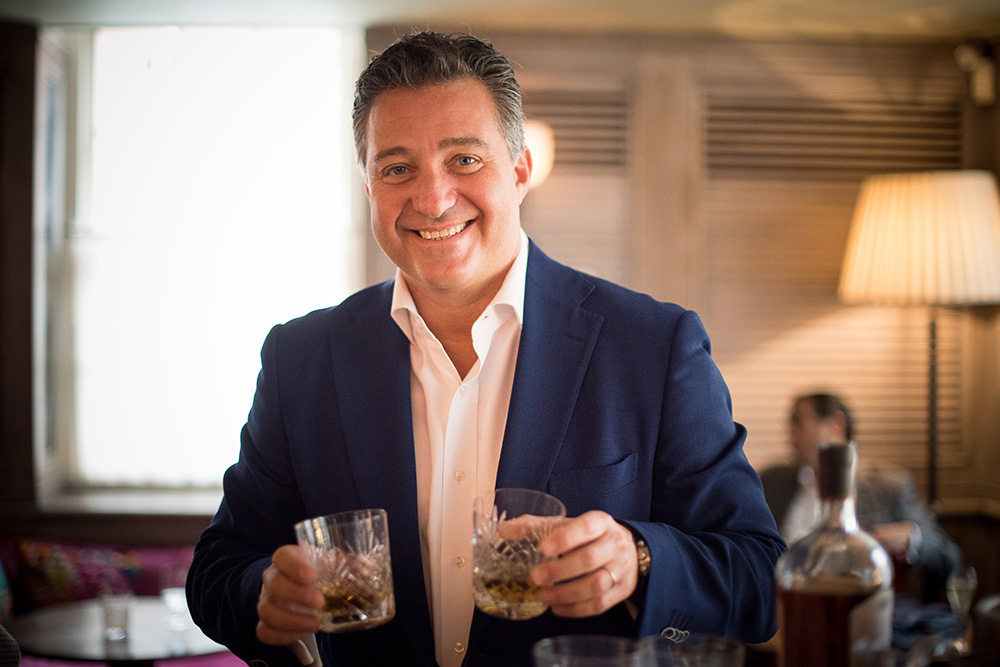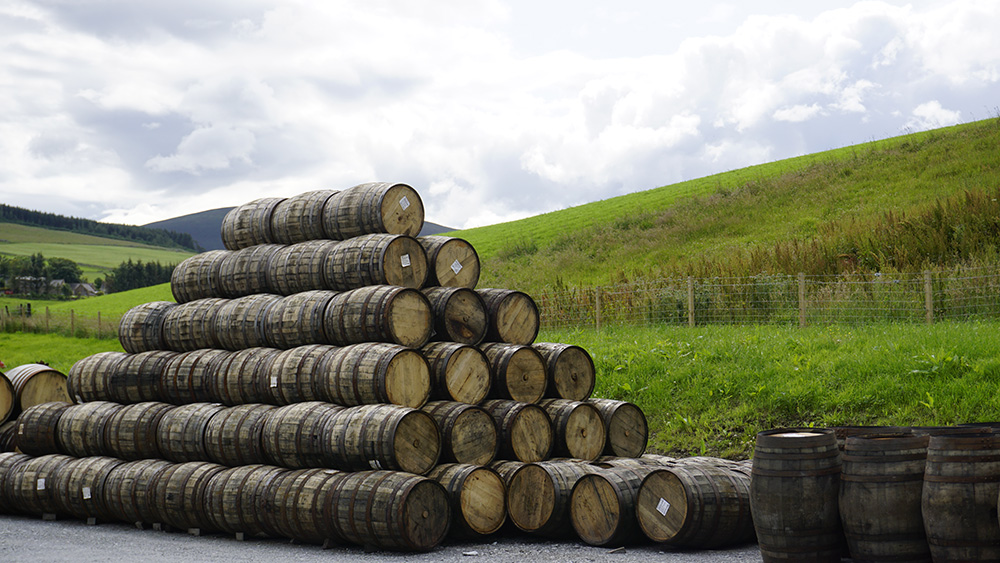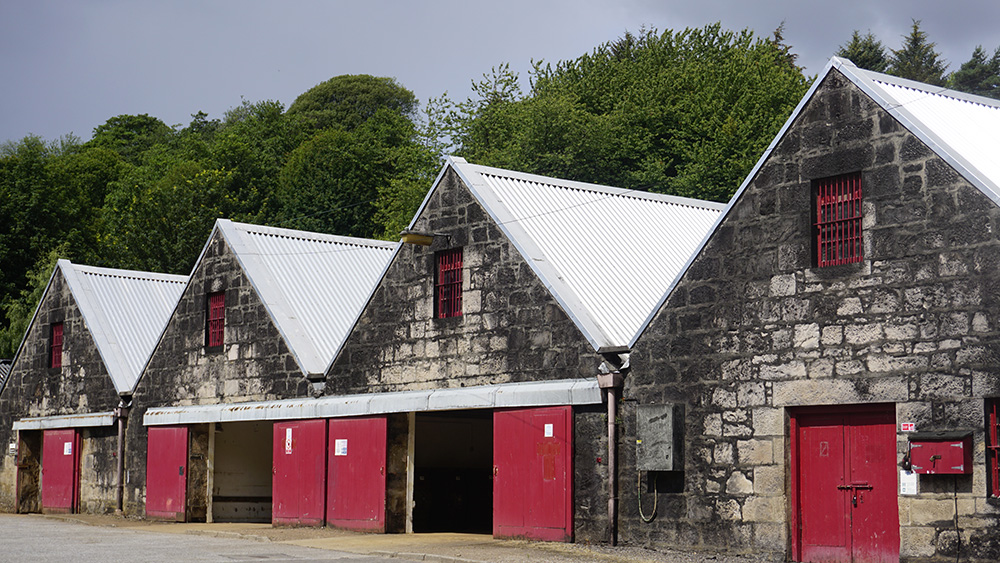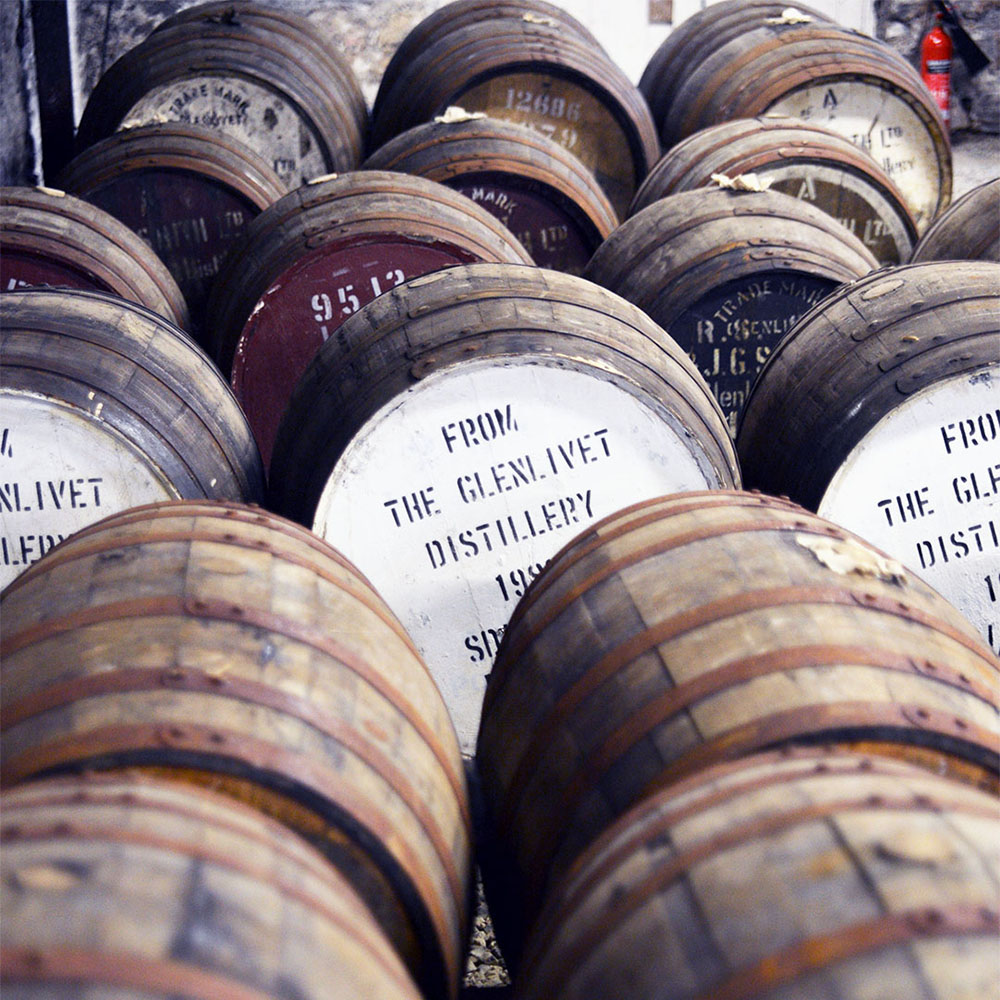
Sir Eric Peacock speaks with Simon Aron, CEO of Cask Trade, about the intricacies – and increasing appeal – of investing in whisky casks.
This interview was originally published in Luxury Briefing issue 222.
Simon, how did a serial entrepreneur end up surrounded by some of the rarest and most exciting whiskies imaginable?
There were two main reasons. I collected over 20 years and in that time, I got to in excess of 2,000 bottles. I used to photograph them, catalogue them and put them into storage, carefully packed and sleeping away. As you know, whisky doesn’t mature once it goes in a glass. That was the first reason – because you graduate, quite simply, from bottles to casks. Bottles are quite difficult to handle; casks are more exciting, and you never know what you’re going to get. The second reason was that my wife turned around and said to me, ‘if you get a chance once in your life to work in a business that involves your hobby and your passion and something you enjoy, do it.’
Over the years, I’ve worked for lots of different businesses. I had 26 years working in technology, which was exciting, but I did quite voluntarily step out from six companies that I’d started and grown because I was a bit bored. Technology was changing and it didn’t really suit where I wanted to go. There was influence from my wife saying, ‘just do it. Just get on with it.’
How did the concept of Cask Trade come about?
Like a lot of businesses, you look for a gap in the market and the experience gained from buying and selling casks. The buying and selling of casks is not a particularly easy thing to do. It’s a very old-fashioned industry, we still have bits of paper flying around in the post when you receive or give ownership legally. If the person isn’t available that day – because they’re sick or on maternity leave or at home, or whatever it may be – you won’t be able to sell your cask. It’s nothing like any other business that I’ve come across, you have to have an enormous amount of patience. But it’s worth it because, dare I say, a very, very high percentage of whisky, if it’s made well and if you have good wood, is going to taste great and you don’t really have to do much to it apart from letting it sleep for a while and enjoy it.
If you’re a broker, in any business, you run the risk of what you’re being offered and what you’re offering out being sold somewhere along the line and you’re always trying to snatch a profit in between. That was the problem that I had, as a buyer. I’d make a decision on the cask and by the time I wanted to go and buy it, it was sold. Or, it never existed and they put it on the list because they wanted to sell me something else.
I’ve been a broker in a past life, and I realised that stock is key. If you own the stock, you can dictate the price, the supply and it’s highly unlikely that you will let anybody down because it’s your stock. I decided to put my money where my mouth was and bought the stock because then we could sell the stock – simple as that. It’s an expensive way of doing business and you do have to have a little bit of a deep pocket, I’ll admit. We are not brokers, we’re stockists.

What were some of the problems that you had as a buyer?
I would pay thousands of pounds to a company selling casks, and then nine months down the road, I would go to take what I call a dip, which is to check how much liquid is in there, maybe take a little sample, see how it’s sleeping and maturing and tasting. And I would wait a month, I would make 10, 20, 30 phone calls and not get anywhere. Then eventually, someone would come back to me and say, ‘yeah, about that cask…’ I had casks that had dropped in strength, we call it ABV, the percentage of alcohol in the liquid. I was sold something at 63 per cent, which is pretty strong for a young whisky, and then I would go and try it and it comes out at 49 per cent, which is actually impossible over a couple of years. Over 30 years, it’s quite possible, it’s to be expected. But when you buy something that’s 12 years old and then you test it at 14, it can’t drop from 63 per cent. It’s physically impossible unless they left it out in the rain. I’ve had casks that weren’t in the wood that I was expecting.
So, I had terrible problems, but this is nothing unusual. If you look at the wine market from the last 10 to 15 years, because of the nature of the business – it’s alcohol, it doesn’t attract capital gains or income tax because it’s a wasting asset – it means that you don’t declare tax until you bottle it. People invest in it, for whatever reason. It’s something that’s advantageous for a lot of people and it’s something they’ve been doing for years in SWAG: Silver, Wine, Art and Gold. I think we should take the wine from the ‘W’ and replace it with whisky because wine is becoming more and more expensive.
My staff and my co-directors all came from wine backgrounds. My co-director, Sir Colin Hampden-White, is a Keeper of the Quaich, he’s now in whisky but he’s also the chairman of the Circle of Wine Writers. A lot of people have been selling wine less honestly than they should, hence whisky and whisky casks. There’s also never been an exit, so if I wanted to sell, unless I knew someone that could sell my cask for me, there was no open market. A lot of my ideas eventuated from my experience over the years buying and selling casks and I thought there had to be a better way of doing it. All my unique selling points are around doing things in a much easier way, that was the idea.
What is the key to that?
Ownership and management. Ownership, because I’ve got a nice selection but management as well. We have, in the relatively short amount of time since we launched [in November 2018], picked up on issues with the casks because we sample and check everything, whereas others just don’t.
Can you share the customer journey with us? I want to invest in whisky casks. I may or may not have experience but if I don’t, I can fall back on the skills of you and your team. So, let’s say I’ve selected that I want to buy in cask – what’s the journey thereafter?
Once you’ve selected the cask, we would normally get it re-gauged and checked, unless it’s been done recently, which is highly likely because we do it to all the casks when we buy them. The stock doesn’t last long on our stock list. If you were an investor looking for something special, you need to be quick. That’s why we are asking people who do want to invest in whisky to park money with us. I don’t need the physical money, but I do need the understanding that the budget is £50,000 or £10,000 and then I will build a portfolio around them. Once they’ve picked something, I have to go one step back. I can’t move on from that point. I have to go to: why are they buying it? For investment? Do they know about whisky? Is it a romantic journey; will they be bottling it themselves and handing it out to their 280 other friends? Are they buying it for the company, or is it a pure investment? If it is, what’s the overall budget and what are they looking to achieve?
We don’t sell new-make [whisky that is less than three years old], because there’s plenty of it around. If you buy from me, you’re going to be buying a three-year-plus, so it’s already single malt and, depending on what your outcome or exit or profit schedule is, I would always recommend to invest in or buy a portfolio of different ages and different distilleries. Never too many of the same so they can cash in at three, five, seven years. The one thing that you won’t find on any of our paperwork or on our website is facts and figures. My competitors are offering guaranteed returns. I don’t offer that because I don’t believe it’s honest. You can only give a rate of return if you buy a number of them individually.
All the casks are different, they’re different ages and they have different reputations. People have never heard of some of the distilleries that we sell because it’s always been used for blended whisky, which is 90 per cent of the whisky market. I wanted to create a market-place. I opened my pricing up to private investors and bottlers with no differentiator. If I’m selling to an investor at the same price as a bottler, the investor knows they’re getting a good deal; the buyer is bottling and moving forward, so I make sure that with uniform pricing, both people get the casks.
I also made sure that I’m selling globally. We’ve got customers from Shanghai, Beijing, Taiwan; we’ve got a whisky bar from Vietnam that buys from us; we’ve got people in Miami that will only buy kosher whisky casks; we’ve got people in New York, groups in Budapest, Prague, and Riga. It is a global phenomenon and it’s not getting any smaller. I have also built auctionyourcask.com, which is an online auction platform where I don’t charge any seller’s fee. It’s zero per cent. All we ask is that they pay to have the cask checked and a sample taken. Any buyer will pay a 15 per cent premium, plus VAT if they are registered and in the UK. It’s a means to an end, you do it because it makes sense to anyone coming in on the front end and buying – they can see that there’s an alternative exit route.
As an investor, should I build into the equation for angel’s share? What is angel’s share?
It is the natural process of evaporation of alcohol as it sits and matures in the cask. Roughly, it’s two per cent a year but it can be more or less, as no cask is the same. It also depends on what the original fill was. Some distilleries, their liquid doesn’t last the years, which means your optimum sale year will be perhaps 18 years. A 50-year-old whisky now has an average price of £6,000 per bottle and it doesn’t stop there.
Macallan is a bit of an anomaly because of their reputation and their marketing machine. If you look at a 50-year-old Macallan, you’re looking at £20,000 to £40,000. I’ve got people who are selling casks to me now that they bought in the ‘90s when they paid £800 plus storage and insurance, which is not a lot. And they’re achieving £40,000 for those casks now. They’ve done nothing to them apart from letting the bonded warehouse or the distillery look after them.
Angel’s share is definitely something you’ve got to keep an eye on because if it falls below 40 per cent, you can no longer call it Scottish single malt whisky. Those are the rules. I guess this emphasises the benefit of having a team around you who have experience, knowledge and can advise a client base.

I was interested to see the titles that you give some of your colleagues, can you run through some of them?
Sir Colin Hampden-White is a Keeper, he’s tasted thousands of single malt whiskies and he has a good palate. He comes in once every two weeks and we give him some samples to taste. Our director, Lee, is the trader, he was a wholesaler of casks for many years and sold thousands, and he’s the one who knows where the litre-age sits amongst all the distilleries. Our sales manager, James, is a young guy who has always had a passion and is the one who drives around and visits 20 to 30 distilleries in a day. He takes photos of all our casks to prove that they exist. Director of sales, Leo, has been selling thousands of casks. We all collaborate and we have a lot of customers – independent bottlers – who help us as well. They will taste for us and we’ll get their opinion and their tasting notes. We sample all the time, it’s very important.
You mentioned that some people are into cask for the romance of it. If you were picking examples of romantic journeys for people who might be buying in cask, what would immediately come to mind?
The romantic journey is doable, which is not true of a lot of our competitors. Without naming names, there are three different companies that exist at the moment as our competitors. One is charging an awful lot of money for buying a nice wooden cask and filling it with new-make from a distillery that’s certainly not tier-one. As an investment, I don’t really think that’s the right way of doing it.
Then there’s another company that sells casks it doesn’t own. They’re brokers – they’ve been struck off as a trading company in the UK, they’ve lost their license to hold it, so they use it through third parties. Again, I don’t really think they should be doing what they’re doing.
Then there’s a third business that I actually have a lot of respect for, which sells the liquid itself so you’ll receive a percentage of the return on the liquid over a number of years. You’ll never see the cask and it is a financial deal. That company is well known for doing futures or options sales and that’s their business model.
Now, all of those three are relatively unromantic. I only sell complete casks; they’re yours and you have the choice to do what you want. Going back to the romanticism of this, the thing that I say to people is: ‘having friends that you can gift whisky bottles to is not the same as your Facebook friends’. Funnily enough, if you do get a cask bottled, the chances of getting that into retail are next to none. You won’t be able to sell the bottle commercially, you need a license to do that. You will get anywhere from 200 to 280 bottles, and unless you’re going to gift them as part of a business – which is questionable, some people say you shouldn’t do that – then you’re going to be left with a couple of hundred bottles after you’ve given them out to friends and family.
The romantic journey has to be thought through. I say to people that if they can find a way of getting a bottle back so they can taste the fruits of their investment, great. That’s very doable, by the way. You can even draw a single bottle as a sample before it’s sold to a bottler. You pay a little bit of duty for the bottle, and that’s yours. And you can keep that, share it and remember what you did.

For those doing this for an investment return, there is the question of portfolio management and the knowledge of you and your team on advising clients on how to balance that portfolio?
Yes, we never recommend anyone buys multiples of the same cask. They can if they wish, but we wouldn’t recommend it because it’s like backing a horse to win and you might not want to do that.
Where’s the catch, what’s the downside to investing in cask?
There are downsides, and people should be aware of them. They need to make sure that they never leave a cask to age for too long. You cannot let a cask fall below 40 per cent, it would be extremely detrimental to any investment. The other thing that they should be aware of is that if they aggressively or enthusiastically invest a huge amount of money into whisky, and are deemed as ‘trading casks’, then it will attract HMRC to charge you income or capital gains tax, so you should declare. The other thing is moving casks. It does lose liquid, so don’t move them around as much as possible, if at all. Leave them, let them be. Other risks include making sure that ownership is moved down through the generations. It’s a very old system, it’s your name on the cask, so please provision for that. It does cause problems in probate if you haven’t made those arrangements. The other risk is that this is not for short-term gain. Anyone investing in a cask is looking at a minimum of three years unless they come in at a very high level. People need to go into it very openly, with regard to the length of the investment.
You come from a technology background – how are you communicating with your customers and potential customers?
Most of the bottlers that we started selling to all came through social media. There are thousands of different groups on Facebook with people and enthusiasts from all over the place. We use Facebook, Instagram, LinkedIn and Twitter, to a certain degree. The difficulty that I have is trust and transparency, which are issues in this market. If you create a marketplace where you can trade with good paperwork and good practice, then you’re ahead of the game.
How have the challenges brought about by the pandemic affected the business and in what ways are you adapting?
We are fortunate enough to be in a business that very rarely gets affected by recessions or depressions! During the pandemic, we sold more whisky casks than ever before. Most people run towards alternative investment during uncertain times and you have to be quick with gold, but whisky affords you more time. Whisky is a perfect investment for diversifying any alternative portfolio. Our customers that bottle and retail single malt, cask-strength whisky sold out globally during the pandemic and wanted more. The challenge we had as a business included not duplicating sales when we were all working remotely, as the stock was moving so quickly. Also, we could not sample, move or bottle casks as the whole industry was shut for four months. Some of the distilleries switched production to making high-alcohol-content hand sanitiser.
What would be your whisky sampling on your final evening on earth, as you reflected on your life?
My idea of a last night on earth and sampling would be a selection of 50-year-old whiskies from 10 of the best distilleries of Scotland. That would do me.
